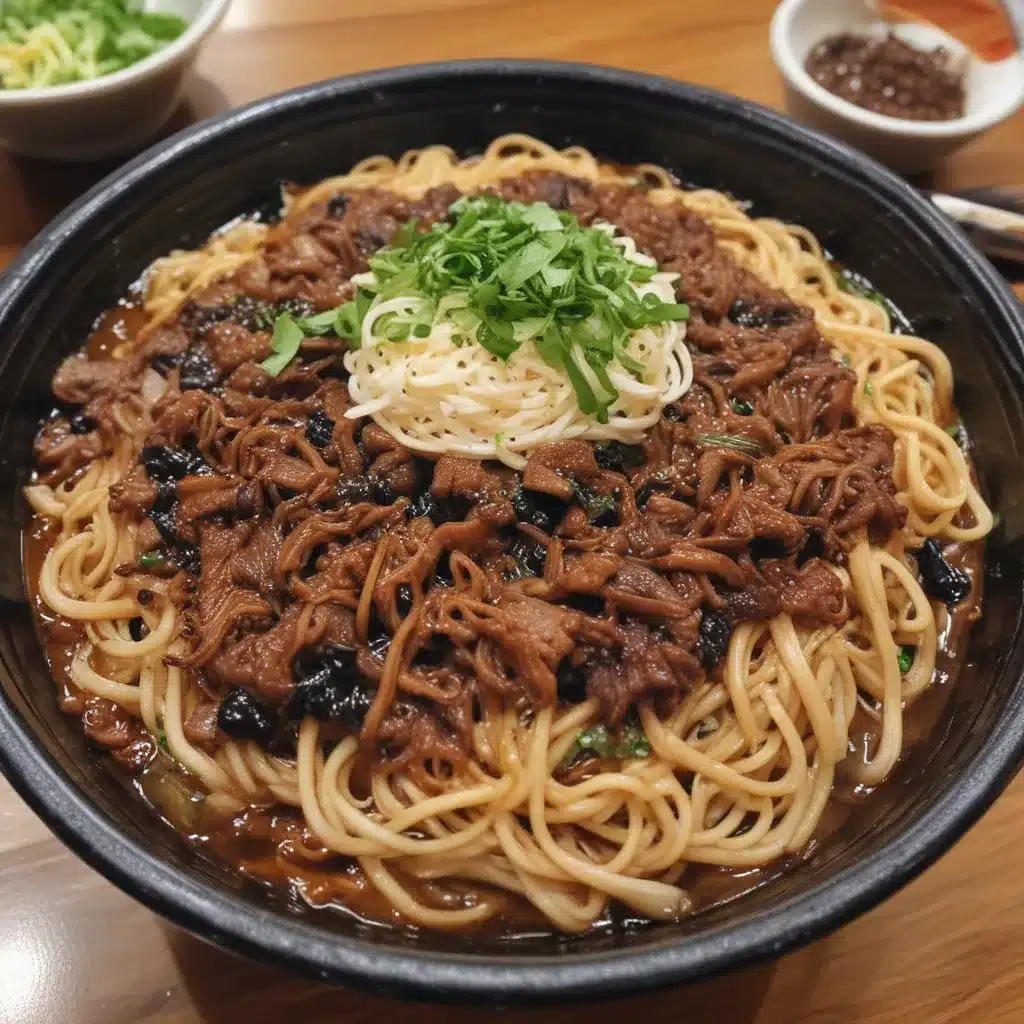
A Noodle Lover’s Adventure in Boston’s Korean Culinary Scene
I have a confession to make – I’m a self-proclaimed noodle junkie. Whether it’s slurping up steaming bowls of ramen, twirling forkfuls of al dente spaghetti, or chowing down on spicy pad thai, I simply can’t resist the allure of perfectly cooked noodles. So when I stumbled upon Korean Garden, a local Korean cuisine hotspot in Boston, and learned about their renowned jjajangmyeon, I knew I had to investigate further.
Diving into the World of Jjajangmyeon
Jjajangmyeon is a beloved Korean noodle dish that’s often described as the “comfort food of Korea.” It consists of thick, chewy noodles smothered in a savory black bean sauce, typically topped with diced pork, onions, and zucchini. Originating from the Shandong province of China, this dish has become a staple in Korean cuisine, with each region and household boasting their own unique spin on the classic.
As I stepped into Korean Garden, the aroma of simmering sauces and freshly cooked noodles instantly had my mouth watering. I eagerly ordered a steaming bowl of their signature jjajangmyeon, eager to embark on a noodle-filled adventure.
The Art of Crafting Jjajangmyeon
The first bite was a flavor explosion. The noodles were perfectly al dente, with a lovely chew that delighted my palate. The black bean sauce, a harmonious blend of savory, slightly sweet, and a touch of saltiness, coated the noodles beautifully, creating a comforting and satisfying mouthfeel.
As I dove deeper into the bowl, I couldn’t help but wonder about the intricate process behind crafting this beloved dish. According to Maangchi, a renowned Korean cooking enthusiast, the key to a delicious jjajangmyeon lies in the careful preparation of the black bean sauce. The sauce is created by sautéing caramelized onions, garlic, and pork in a dark soy sauce-based liquid, resulting in a rich, complex flavor.
Exploring the Noodle Variations
But Korean Garden didn’t stop at the classic jjajangmyeon. As I scanned the menu, I was delighted to discover a wide array of noodle dishes that showcased the culinary creativity of the chefs.
One dish that caught my eye was the japchae, a stir-fried glass noodle dish made with sweet potato noodles, vegetables, and beef. Japchae’s origins can be traced back to the 17th century, when it was a celebratory dish served at royal court banquets. The combination of the chewy noodles, tender beef, and a slightly sweet soy-based sauce made for a truly delightful culinary experience.
Another standout was the bibim-guksu, a cold noodle dish that showcased the versatility of Korean cuisine. Bibim-guksu features thin, chewy noodles tossed in a spicy, tangy sauce, topped with an array of fresh vegetables and a soft-boiled egg. The contrast of the chilled noodles and the vibrant, flavorful sauce created a refreshing and invigorating dining experience, perfect for the warm Boston summer.
Embracing the Noodlemania
As I continued to explore the menu, I was amazed by the sheer variety of noodle dishes on offer. From the classic tteokbokki (spicy rice cakes) to the comforting kalguksu (knife-cut noodles in broth), Korean Garden had truly become a noodle lover’s paradise.
One dish that particularly piqued my interest was the ddukbokki, a spicy, chewy rice cake dish that’s a staple Korean street food. Ddukbokki is said to have originated in the 1950s as a cheap and filling meal for the working class, but it has since become a beloved snack enjoyed by people of all ages.
As I savored the bold flavors and satisfying textures of the ddukbokki, I couldn’t help but marvel at the culinary ingenuity of the Korean people. Their ability to transform humble ingredients into dishes that are both comforting and captivating is truly remarkable.
Embracing the Korean Culinary Adventure
My visit to Korean Garden was a true noodle lover’s dream come true. From the classic jjajangmyeon to the innovative variations, I was swept away by the depth and diversity of the Korean noodle landscape.
As I reflect on my experience, I’m reminded of the words of the team at Korean Garden, who strive to “bring the authentic flavors of Korea to Boston.” Through their dedication and culinary expertise, they have created a haven for noodle enthusiasts like myself, where we can explore the rich tapestry of Korean cuisine and immerse ourselves in the delicious world of noodlemania.
